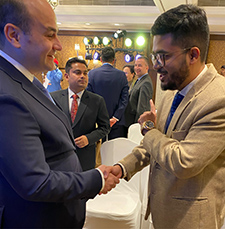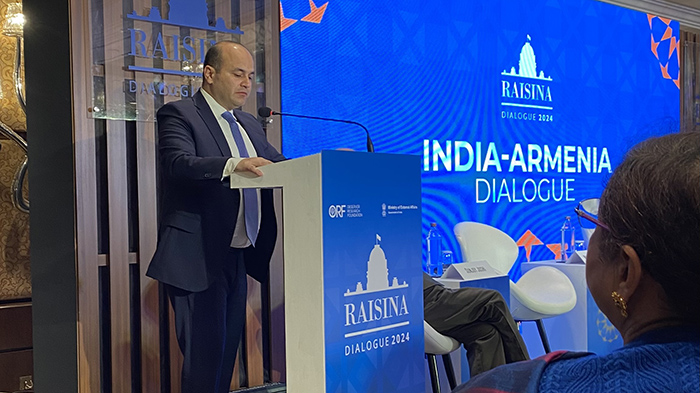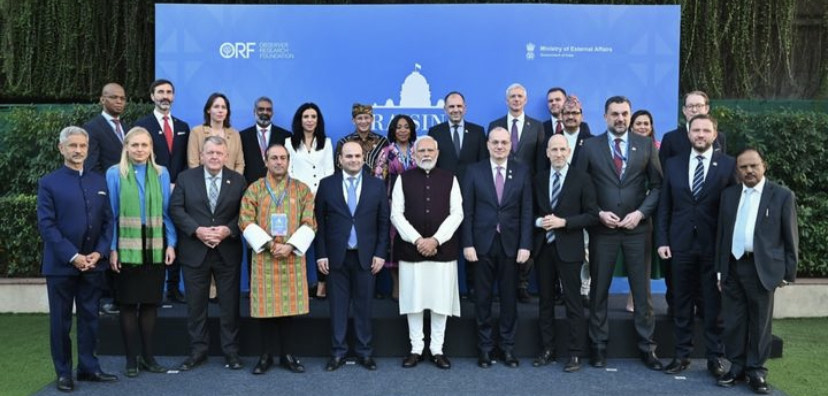[ad_1]


ARUNANSH B. GOSWAMI
What do India, and Armenia have in common? First and foremost they are civilizational states with thousands of years of recorded history. Second Christianity reached these countries very early, several years before it reached Western Europe, Saint Thomas preached the Gospel in India and Saints Bartholomew and Thaddeus in Armenia.
Third, centuries of migrations have allowed large diaspora communities hailing from these countries, develop in several parts of the world, especially in the USA, chasing the American dream, Indian Americans and Armenian Americans have been contributing significantly to the economy of the USA. Fourth, history of brave freedom fighters who fought against Turkic oppressors such as Antranik Ozanian, and Chatrapati Shivaji Maharaja.
Fifth similar Geopolitical challenges in the contemporary world especially from the growing geostrategic bonhomie between Türkiye, Azerbaijan and Pakistan. There are several other commonalities that have catalyzed the process of the emerging geostrategic synergy between both these countries in the year 2024.
Raisina Dialogue 2024
The growing synergy between both these countries was observable at the Raisina Dialogue 2024, India’s premier conference on geopolitics and geoeconomics in Delhi. The first India-Armenia dialogue as a part of this event was addressed by the Honourable Minister of Labour and Social Affairs of Armenia Mr. Narek Mkrtchyan as a representative of the Government of Armenia.
A Research Fellow from the Applied Policy Research Institute Armenia, madam Nvard Challikyan addressed the gathering and explained cartographically the Armenia-Azerbaijan conflict, even explaining about Turkish Prime Minister Recep Tayyip Erdogan’s mission to connect Türkiye with Central Asian Turkic states, she also acknowledged the fact that Armenia is buying arms in huge quantity from India, and mentioned about the Azerbaijani and Turkish open support to Pakistan on Kashmir issue.
More than 100 thousand Armenians have been displaced from Nagorno Karabakh as a result of the ethnic cleansing perpetrated by Azerbaijan, reminding Indians of the Kashmiri Pandit exodus and genocide. The slogans of ‘Qarabag Azerbaicandir (Karabakh belongs to Azerbaijan)’ and ‘reliv, seliv ya geliv (convert, leave or die) have a commonality both are raised by people with genocidal intentions. In Britain Mr Jonathan Lord Conservative MP for Woking said that just as we must never forget about the Holocaust, we must not forget this Genocide (Kashmiri Pandit Genocide). The plight of Armenians in Karabakh and Hindus in Kashmir valley is similar.
Honorable Minister Mr. Mkrtchyan in his speech referred to “Integral Humanism” of contemporary Indian government which is also the guiding ideology of the ruling Bhartiya Janta Party as explained by Pandit Deendayal Upadhyaya. In an interview to this author, the Honorable Minister mentioned that “Armenia wants peace but statements coming from Azerbaijan against the sovereignty and territorial integrity of Armenia now and then are impediments to that lasting peace” he mentioned about the ethnic cleansing of Armenians in Nagorno Karabakh by Azeri army, highlighted the importance of the “Crossroads of Peace” initiative of Armenia’s Prime Minister Nikol Pashinyan and welcomed India to invest in infrastructural development in Armenia, such as kindergartens, North-South roads and tunnels.
India is selling high quality weapons to Armenia and strategic experts are aware about it, Azerbaijani President Ilham Aliyev has been critical of this development he called it “unfriendly” but for Indians it doesn’t make any difference, when his foreign policy is hurting Indian national interests in obvious ways. Anti India sentiment is already widespread in Azerbaijan, and the ruling government is utilizing common Azeri anger against Armenia for strengthening it’s political power.
Slogans of ‘Iki devlet tek millet’ meaning ‘two states, one nation in reference to Türkiye and Azerbaijan’ and ‘Qarabag Azerbaicandir’ meaning ‘Karabakh belongs to Azerbaijan’ can be found written in several parts of Azerbaijan, along with slogans visitors can also see the flags of Türkiye, Azerbaijan and Pakistan at different location with the photos of Azeri soldiers who died during the second Nagarno-Karabakh war.
Government of India doesn’t intend to be a geopolitical ostrich and ignore the obvious strategic threats emerging from Azerbaijani and Pakistani nexus to destabilize Armenia a friendly country in the South Caucasus where thousands of Indian students go for studies especially medical studies, several Indian workers work in the food and groceries delivery business, and that can be India’s gateway to Europe via Georgia and Russia.


Military Cooperation
As per the office of President of Azerbaijan Ilham Aliyev, during the visit of Chief of Pakistan’s Army Staff Asim Munir, he hailed the continuous support the government and people of Pakistan provided to Azerbaijan during it’s conflict with Armenia. The fact that Pakistan did not establish diplomatic relations with Armenia because of this country’s aggression was described by him as demonstrating a brotherly attitude toward Azerbaijan. He pointed out the importance of conducting joint military training between the two countries and reiterated that Azerbaijan had always supported brotherly Pakistan on the issue of Jammu and Kashmir.
Asim Munir congratulated Azerbaijan on its Victory in the Second Karabakh War and once again emphasized that Pakistan, remaining committed to fraternal relations with the people of Azerbaijan, had not recognized Armenia until today. The Azerbaijani Pakistani nexus against the national interests of civilizational states of India and Armenia is for the world to see, in an India moving away from Nehruvian flawed idealism that caused the 1962 military disaster, increasing Indo-Armenian defense cooperation makes utmost geostrategic sense.
While India doesn’t have boots on the ground in the Nagarno-Karabakh conflict unlike Pakistan as per several sources, but it is helping its friend Armenia by high quality arms sales, we need to make it easier for Armenia to buy these arms and also train Armenian defense personnel so that they can defend themselves from the genocidal intentions of their neighbors Azerbaijan and Türkiye.
Conclusion
From education to infrastructure, from space to pharmaceuticals, from Artificial Intelligence to robotics and much more, even sky is not the limit for the cooperation between India and Armenia. Both these civilizational states have survived several invasions and still exist on the face of the earth manifesting their strength, to tell the saga of bravery of their ancestors.
Challenges remain, Erdogan has Neo-Ottomanist and Pan-Turanic aspirations spreading Turkic influence from Balkans to the borders of China, Ilhan Aliyev wants to occupy more Armenian lands to connect Azerbaijan with Türkiye and Pakistan army has not given up on it’s believe in success of “Ghazwa-e-Hind” one day, even after loosing all wars against their Indian counterparts.
Once a peace loving Indian Prime Minister Atal Bihari Vajpayee went to Pakistan in a bus and even visited Minar-e-Pakistan, a symbolic icon of Pakistan’s creation, and proclaimed that we will not let war happen again, but to his surprise Pakistani army attacked India at Kargil even though we won that war but it is something that Armenian friends can learn from, while formulating their neighborhood foreign policy, and stay protected. Coming together of India and Armenia as strategic partners will increase their geostrategic strength substantially, it will help counteract the war mongering of our expansionist neighbors and ensure a more peaceful world.
Arunansh B. Goswami,
Advocate at Supreme Court of India and member Armenia’s delegation to Raisina Dialogue 2024
[ad_2]
Source link










